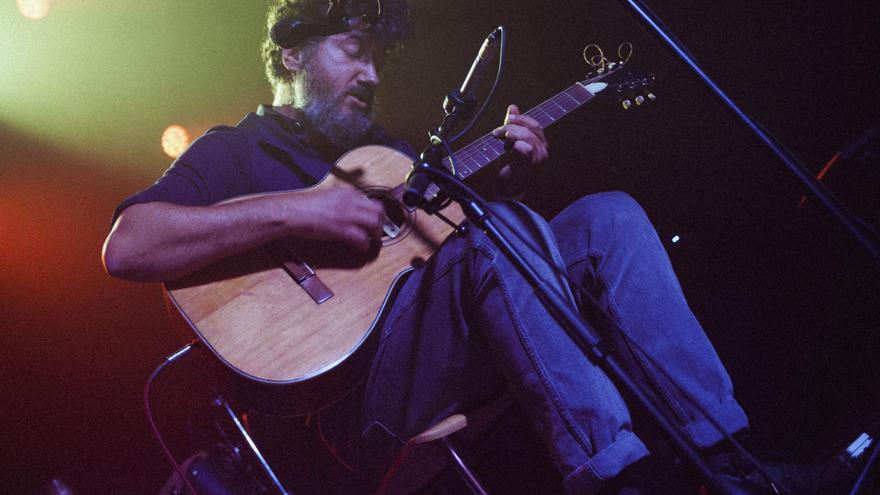
Fajardo will present his new album, ‘Trecho’, this Friday, 5th July, at 8.30 pm, at the Arequipa venue, 6 El Sebadal, and on the 19th of the same month, at 9.00 pm, at Equipopara in Santa Cruz de Tenerife. The artist from Fuerteventura reflects on his career through a work with classics from his discography in a live format and previews new tracks from his various parallel projects like Rebiche, San Borondón No Muere, or Dragón.
[–>
Each of Fajardo’s albums is the result of a blend of sincerity and the most absolute spontaneity. The musician from Gran Canaria does not plan formats or styles in his work, he simply lets himself be carried away by what his songs require. This can be seen when we look at his discography, where there are acoustic works, instrumentals, or collaborations of all kinds. And he proves this once again in Trecho, his 2024 album that has been recorded live with songs that represent a part of his career spanning his first twelve years in the music industry, covering the period from 2008 to 2021.
The album, recorded live on the 13th of March 2023, will be presented tomorrow, Friday, 5th July, at 8.30 pm, at the Arequipa 6 venue in El Sebadal. It will be performed live again on the 19th of July, at 9.00 pm, at Equipopara in Santa Cruz de Tenerife. Subsequently, in August, the musician from Gran Canaria will embark on an extensive tour that includes stops in major cities on the mainland. José Antonio Fajardo, originally from Fuerteventura and now residing in Las Palmas de Gran Canaria. In this new album, he reimagines his classics such as Mil muros or Qué quiere el hombre, which had not been released on vinyl until now, along with songs from his previous four albums, now presented in emotional and sensitive versions such as Dónde está or Volcán. “It’s a live session in a context that is not the usual recording studio,” says the artist. “Regarding the format, it’s the songs that lead, that whisper to me, that tell me ‘this would be good to do in this way or another’, and they are the ones in charge.” In fact, his next album “might be a combination of both formats, some tracks with minimal instrumentation along with others featuring collaborations with other musicians.”
Returning to Trecho, the album was recorded on quarter-inch tape in a lively hangar located in Villamayor de la Armuña, in Salamanca. The album is released by Comunidad de Regantes, the first reference of a project that aims to capture the artist’s essence in a special sonic environment.
Since his first tour on the mainland in 2009, Fajardo’s career has matured towards the unmistakable, with an absolute personality. In 2024, his trajectory includes five full-format albums, several singles and splits, and an EP, in addition to various parallel projects like Rabiche or San Borondón no muere, where he plays the drums and will release new tracks soon, as well as numerous collaborations with artists of all kinds. His work with storyteller Orlando Santana stands out at this point. “We have made forays into the oral world including dance with a show called Servir a las brujas that we presented in Tenerife and Las Palmas,” he emphasizes. Regarding the supergroup Rabiche, Fajardo adds that it “will have the journey that the collective sets for itself.” It should be understood that “everyone lives in Tenerife and I live in Gran Canaria, but we will perform at the Hero Fest in El Hierro at the beginning of September.”
Regarding his other projects, Dragón, where Fajardo plays the guitar and Héctor Matacherry plays the piano, he notes that “new songs are already planned.” Fajardo’s debut album was released in 2009 with a self-titled record that positioned him in the wild side of singer-songwriters. Following that were the EP Muñecos in 2011, two splits – recorded with Malcortado and Monte in 2010 and 2012 respectively – and the single S/T in 2014. A second album, titled Arrullo Magnético (2015), showcases Fajardo in excellent form as a composer and performer, followed by Intuición (2021), in a more band-oriented format, with tracks like Volcán, Intuición, and Deidad, staples in his repertoire. A record in which the musician moved away from contemporary neofolk to flow through the channels of slowcore or post-rock.
















